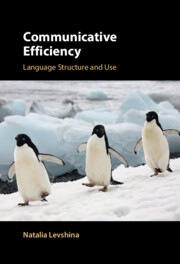Book contents
- Communicative Efficiency
- Communicative Efficiency
- Copyright page
- Dedication
- Contents
- Figures
- Tables
- Preface
- Acknowledgements
- Abbreviations
- Part I Different Types of Efficiency in Language
- Part II Efficiency and Language Evolution
- Part III Case Studies
- 7 Efficient Form–Meaning Mapping in Causative Constructions
- 8 Differential Case Marking and Efficiency
- 9 Efficient Use of Function Words in English Alternations
- 10 Conclusions and Perspectives
- Appendices
- References
- Index
7 - Efficient Form–Meaning Mapping in Causative Constructions
from Part III - Case Studies
Published online by Cambridge University Press: 03 November 2022
- Communicative Efficiency
- Communicative Efficiency
- Copyright page
- Dedication
- Contents
- Figures
- Tables
- Preface
- Acknowledgements
- Abbreviations
- Part I Different Types of Efficiency in Language
- Part II Efficiency and Language Evolution
- Part III Case Studies
- 7 Efficient Form–Meaning Mapping in Causative Constructions
- 8 Differential Case Marking and Efficiency
- 9 Efficient Use of Function Words in English Alternations
- 10 Conclusions and Perspectives
- Appendices
- References
- Index
Summary
This chapter presents evidence based on typological data, corpora and an artificial language learning experiment that supports the claim that form–meaning correspondences in causative constructions are best explained by the Principle of Communicative Efficiency. Other accounts which involve iconicity and productivity as explanatory factors are less successful in predicting and explaining the famous correlation between formal and semantic integration of events in causative constructions. Moreover, this account explains other form–meaning correspondences beyond event integration and the distinction between direct and indirect causation, such as intentional or accidental causation. Finally, this account predicts correctly the emergence of efficient formal asymmetries in an artificial language learning experiment.
Keywords
- Type
- Chapter
- Information
- Communicative EfficiencyLanguage Structure and Use, pp. 155 - 192Publisher: Cambridge University PressPrint publication year: 2022



